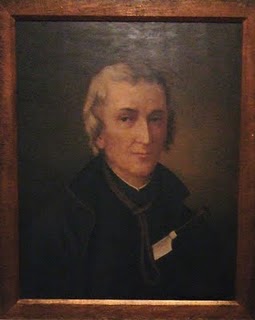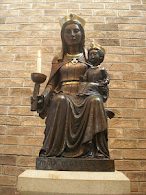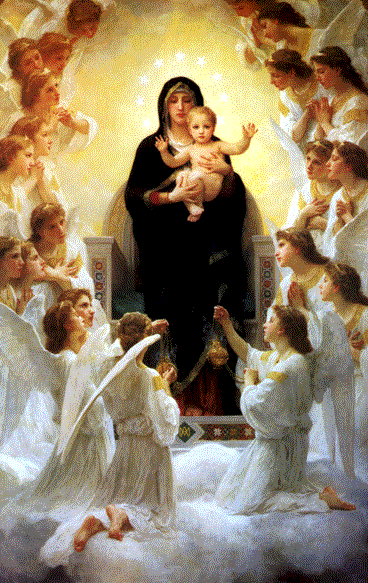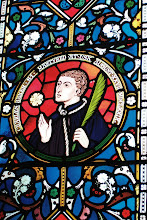In writing about St John the Baptist, E
LeJoly said:
“John the Baptist points to God, a signpost on the way of life, for men to see and obey. John the Baptist comes as a witness. Filled with love for God, he has one thought, one concern, one purpose: to direct men’s minds and hearts to the Saviour who comes, to the Light of men, that they may turn to Him and believe in Him.”
In St John’s Gospel we read that John the Baptist “Came to bear witness to the Light.” LeJoly tells us that John bears witness through his mode of life and through his preaching. “There is no greater calling than to witness to the Light, that men may believe in Jesus. The Father sent John to be the herald announcing His Son. The Holy Spirit inspired him as he inspired the older prophets and the apostles and saints of the New Testament. They witnessed by their personality, their speech, their life, even unto the shedding of their blood. They witnessed to Christ under the lash, on the gridiron, chained in prison. They proclaimed Him the Lord when stoned, bound to crosses, thrown to wild beasts.”
St David Lewis bore witness to Christ by
his personality and his mode of life. He studied at the English College in Rome and
an entry in the College Diary describes him as “Vir prudens et pius”, that is “a
wise and holy man”. Later, in his
ministry in Wales, he travelled the countryside, usually at night, on foot or on
horseback to care for the persecuted Catholics.
But no person, Catholic or otherwise, was outside his love and concern
and his kindness to all earned for him the affectionate appellation of “Tad y Tlodion” or “Father of the Poor”.
Like St John the Baptist and the saints and martyrs of the New Testament, St David Lewis bore witness to the Light by the shedding of his blood. As he prepared to celebrate Mass on Sunday, 17th November 1678, Fr David Lewis was arrested at Llantarnam. Betrayed by his so called friend, John Arnold, he was conveyed to Monmouth Gaol where he was incarcerated for several months. Then, on a bitterly cold day in the dead of winter, 13th January 1679, he was moved to Usk Gaol. At the March Assizes in Monmouth, David Lewis was condemned as a Catholic priest who said Mass. In passing sentence, Judge Atkins said, “He that uses to read Mass commits treason”. Convicted of High Treason, Fr Lewis was sentenced to be hanged, drawn and quartered, the usual punishment for High Treason. He was returned to Usk Gaol.
In April of 1679, Fr David Lewis, Fr
John Kemble, Fr Roger Hanslip and Fr John Wall were ordered to London to be
questioned by the odious Titus Oates and his fellow perjurers, William Bedloe
and Stephen Dugdale. The four priests
were lodged in vile conditions in Newgate Prison. Although they were rigorously interrogated by
the trio, no evidence of involvement in any plot could be found against
them. Indeed, there was no evidence of a
plot at all! The priests were offered
freedom and wealth if they would perjure themselves with details of a
nonexistent plot or renounce their faith.
All four priests unequivocally refused.
They were sent back to their respective prisons to await their fate.
For Fr David Lewis S J this came on 27th August 1679. On that summer day David Lewis gave witness by his holy manner and the courageous way in which he willingly shed his blood for Christ. The name of St David Lewis was added to the Church’s list of Martyred Saints on 25th October 1970 when he and 39 others were canonised by Pope Paul VI in Rome. Collectively they are known as the Forty Martyrs of England and Wales.
From the beginnings of Christianity the followers of Jesus have been persecuted. Right down to the present day, Christians are bearing witness to Christ through persecution and death. On this feast of St John the Baptist, let us be mindful of the sufferings of our fellow Christians around the world and keep them in our prayers.
Let us also be mindful of our great blessing of freedom of worship. Never take it for granted!









.JPG)

.JPG)






At Sunday's liturgy celebrating the feast of John the Baptist, Father Cyprian used an interesting analogy. He said that Jesus was born during the Winter Solstice when sunlight was beginning to increase a little each day. John the Baptist was born during the Summer Solstice when sunlight is beginning to decrease a little each day. Then he quoted John the Baptist saying "He (Jesus) must increase and I must decrease." I was really struck by that!
ReplyDeleteHello Sr Ann Marie
ReplyDeleteSo nice to hear from you. That is a very powerful analogy. Thank you for sharing it with us. I hope all is well with you. God bless you, dear Sister.